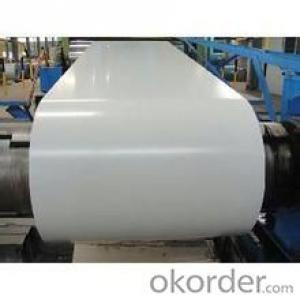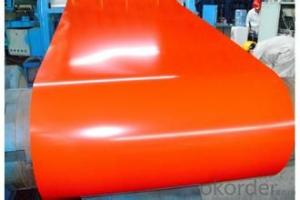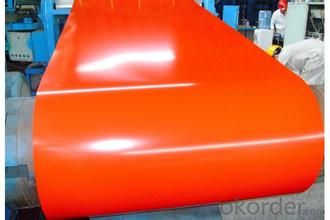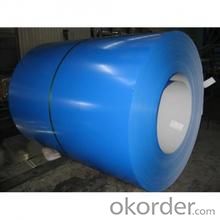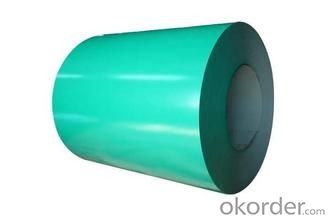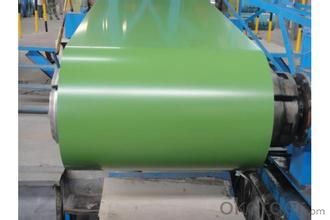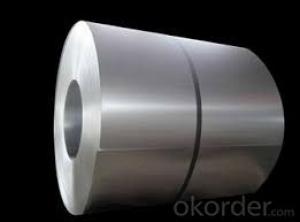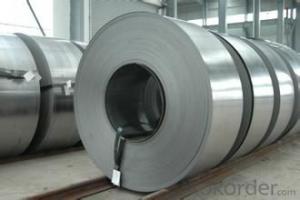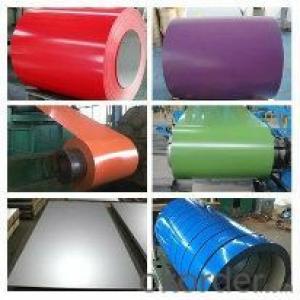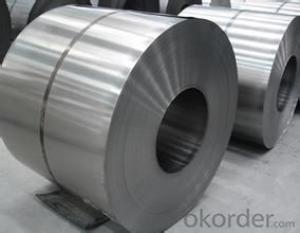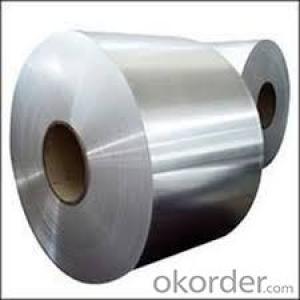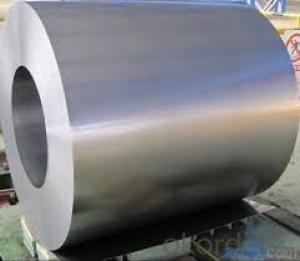excellent cold rolled steel coil / sheet / plate -SPCE
- Loading Port:
- Tianjin
- Payment Terms:
- TT OR LC
- Min Order Qty:
- 30 m.t.
- Supply Capability:
- 5000000 m.t./month
OKorder Service Pledge
OKorder Financial Service
You Might Also Like
Specification
The raw material of cold rolled steel coil/sheet is high quality hot rolled product, and after pickling, kinds of new technology and new process of global cold rolling production have been applied. Therefore the manufacturing, home appliance, automobile etc.
COLD ROLLED STEEL | |
Thicknenss | 0.10mm-4.00mm |
Width | 600mm-2000mm |
Sheets length | 1200-6000mm |
Coil inner diameter | 508-610mm |
Surface treatement | matt finish/bright finish,oiling/dry, bright anneal/black anneal |
Coil weight | 3-5t |
General Application of Cold Rolled Steel Coil:
1. Refrigerators, cabinets, power distribution baords and drums.
2. Automobile floor and roof panels.
3. Automobile fenders and quarter panels
4. Automobile fenders and quarter panels
General Application of Cold Rolled Steel Coil:
1. Refrigerators, cabinets, power distribution baords and drums.
2. Automobile floor and roof panels.
3. Automobile fenders and quarter panels
4. Automobile fenders and quarter panels
We sincerely hope to establish good and long-term business relationship with your esteemed company.
- Q: I want to know if it is possible to make regular steel stainless.From what I understand stainless consist of chromium about 10 percent I think.Any way I'm wondering if properties can be added in a process or can this only be possible during actual manufacturing of the steel.And I'm not talking about chrome like stainless steel that's not to shiny.
- Ghost rider is sort of right. Yes, if you want to change the bulk composition, you need to melt it to add different elements. However, If you just want to provide some improved corrosion protection (and money is no object) there are all sorts of things that are technically possible that will provide different surfaces with different corrosion characteristics. It depends on exactly what type of corrosion you are worried about. The details also depend, of course, on exactly what regular steel you are talking about. There are hundreds of different commercial steel alloys so you need to be specific. In general, you can galvanize (coat with Zn), electroplate with Ni or Cr or Sn or gold or etc, you can do carburization, ion nitriding, carbo-nitriding, (these are surface hardening technologies which will influence corrosion performance).
- Q: I've heard on some 1911 forums that the slides of Armscor guns are now extruded. What is extruded steel? How is it made? Are they strong (4140carbon steel was used in the process).
- Extruded steel is only the steel being run through a die when it is heated, it usually reduces the size of the grain of the steel itself, enhancing toughness. Realistically though, in a handgun, it doesn't matter if the frame is cast or forged, both types will hold up to any amount of abuse, unless you use it as a sledgehammer, and are splitting stones with it, then the forged frame would win. 4140 is more than adequate for a slide/frame. Hell, even mild steel would be adequate as long as you don't mind some dings and scratches, and again, don't use it as a sledgehammer...
- Q: What are the challenges in coil slitting for thin gauge materials?
- Successfully operating coil slitting for thin gauge materials involves addressing a specific set of challenges. One major challenge is ensuring the proper handling and stability of the thin gauge material. The material's susceptibility to deformation, wrinkling, or tearing increases as it becomes thinner. To tackle this, careful attention must be given to the handling equipment and techniques used during the slitting process. This is necessary to maintain the appropriate tension and support throughout the operation. Another challenge is maintaining consistent and precise slitting widths. Thin gauge materials are often used in applications where accuracy is crucial, such as electronic components or automotive parts. Any variation in the slitting width can cause functional defects or assembly problems. Achieving precise slitting widths in thin gauge materials requires the use of high-quality slitting knives, well-maintained slitting machinery, and accurate tension control systems. In addition, thin gauge materials are more prone to surface defects, such as scratches or burrs, during the slitting process. These defects can impact the material's appearance, performance, or even its safety. To minimize the occurrence of surface defects, it is important to carefully select slitting knives and regularly maintain the slitting machinery. Furthermore, thin gauge materials often possess a higher yield strength, making them more resistant to deformation. This poses a challenge when it comes to achieving clean and straight edges during the slitting process. Special considerations must be taken to ensure that the slitting knives are sharp and properly aligned, allowing for clean cuts without introducing any edge defects. Lastly, thin gauge materials are generally more sensitive to external factors such as temperature, humidity, or static electricity. These factors can affect the material's dimensional stability, resulting in variations in slitting width or other quality issues. Therefore, it is crucial to establish appropriate environmental conditions and implement effective anti-static measures to minimize the impact of these factors. To summarize, the challenges associated with coil slitting for thin gauge materials revolve around handling and stability, maintaining precise slitting widths, minimizing surface defects, achieving clean and straight edges, and mitigating the influence of external factors. Overcoming these challenges requires a combination of suitable equipment, techniques, and operational controls to ensure high-quality slitting outcomes.
- Q: What are the typical coil thickness options?
- The typical coil thickness options vary depending on the specific application and industry. However, common coil thickness options range from 0.005 inches (0.13 mm) to 0.250 inches (6.35 mm).
- Q: How are steel coils shipped internationally?
- Steel coils are shipped internationally using various methods to ensure their safe and efficient transportation. The most common method is through container shipping, where steel coils are loaded into standard shipping containers for transportation. These containers are specifically designed to handle heavy and bulky cargo, such as steel coils. To load the steel coils into the containers, they are usually stacked horizontally and secured with steel strapping or metal bands to prevent movement during transit. This ensures stability and minimizes the risk of damage. Additionally, wooden or metal dunnage may be used to separate and secure the coils to further prevent shifting. Once loaded, the containers are sealed and transported to the port using trucks or trains. At the port, the containers are loaded onto cargo ships, either by crane or using specialized equipment such as roll-on/roll-off (RO-RO) vessels or semi-submersible ships. These ships provide a secure environment for the steel coils during the journey, protecting them from weather conditions and potential damage. During the voyage, the steel coils are subjected to various safety measures to prevent corrosion and protect their integrity. These measures include applying protective coatings, such as oil or special paints, and using desiccants or humidity control systems inside the containers to regulate moisture levels and minimize the risk of rusting. Upon reaching the destination port, the containers are unloaded from the ship and transferred to trucks or trains for further transportation to their final destination. At this stage, the steel coils may undergo customs clearance and inspection procedures before being delivered to the intended recipients. Overall, international shipping of steel coils involves meticulous planning, secure packaging, and the use of specialized containers and equipment to ensure their safe and successful transport.
- Q: How do steel coil manufacturers ensure timely delivery?
- Steel coil manufacturers ensure timely delivery through various strategies and measures. First and foremost, they maintain a well-coordinated production and supply chain management system. This includes efficient scheduling of production processes, monitoring of inventory levels, and close coordination with suppliers of raw materials. Additionally, steel coil manufacturers often employ advanced forecasting techniques to predict the demand for their products. By analyzing historical data, market trends, and customer behavior, they can anticipate future orders and plan their production accordingly. This proactive approach minimizes the risk of delays and allows for better resource allocation. Furthermore, manufacturers work closely with transportation and logistics companies to ensure smooth and timely delivery. They establish strategic partnerships and negotiate favorable agreements to facilitate efficient transportation of steel coils to customers. This includes optimizing routes, utilizing reliable carriers, and closely tracking shipments to promptly address any unforeseen issues. Moreover, manufacturers may maintain buffer stocks to mitigate the impact of unexpected disruptions, such as equipment failures or supplier delays. By having a safety stock of finished products, they can quickly respond to urgent orders and maintain their delivery commitments. Lastly, effective communication plays a crucial role in ensuring timely delivery. Steel coil manufacturers maintain open lines of communication with their customers, keeping them informed about production progress and potential delays. This transparency allows for proactive problem-solving and helps in managing customer expectations. In conclusion, steel coil manufacturers ensure timely delivery by maintaining efficient production and supply chain management systems, utilizing advanced forecasting techniques, collaborating with transportation and logistics companies, maintaining buffer stocks, and maintaining effective communication with customers. These strategies collectively enable them to meet delivery deadlines and provide reliable service to their customers.
- Q: How are steel coils used in the manufacturing of construction equipment?
- Steel coils are used in the manufacturing of construction equipment as they serve as a primary raw material for the fabrication of various structural components such as frames, bodies, and chassis. These coils are typically processed through cutting, bending, welding, and shaping techniques to create the necessary parts that provide strength, durability, and stability to construction machinery.
- Q: How are steel coils inspected for dimensional accuracy during processing?
- Steel coils are inspected for dimensional accuracy during processing through various methods such as measuring tape, calipers, laser scanners, or automated vision systems. These tools are used to measure the length, width, and thickness of the coils to ensure they meet the required specifications and tolerances.
- Q: i know theres steel in it but what else?
- Corrosion resistant steel. Iron carbon alloy with a minimum of 10.5% chromium (Cr) content.
- Q: I was wondering if steel cases can be loaded to the same pressure as brass cases. Are the cartridges that commonly feature steel cases like the Russian 5.45x39, 7.62x39 and 7.62x54R loaded to a lower pressure than their C.I.P. MAPs (380 MPa, 355 MPa, 390 MPa --gt; 51,488 psi to 56,564 psi)? There must be a reason why most NATO armies use brass cases...
- Steel cases are harder to manufacture, but cheaper in material. Loaded? Yes. Those cases are a very mild steel, and will 'flow' well enough to seal at the pressures involved. The question might come up with low pressure loads though. RE-loaded?? - I wouldn't try it, even if they weren't berdan primed.
Send your message to us
excellent cold rolled steel coil / sheet / plate -SPCE
- Loading Port:
- Tianjin
- Payment Terms:
- TT OR LC
- Min Order Qty:
- 30 m.t.
- Supply Capability:
- 5000000 m.t./month
OKorder Service Pledge
OKorder Financial Service
Similar products
Hot products
Hot Searches
Related keywords
